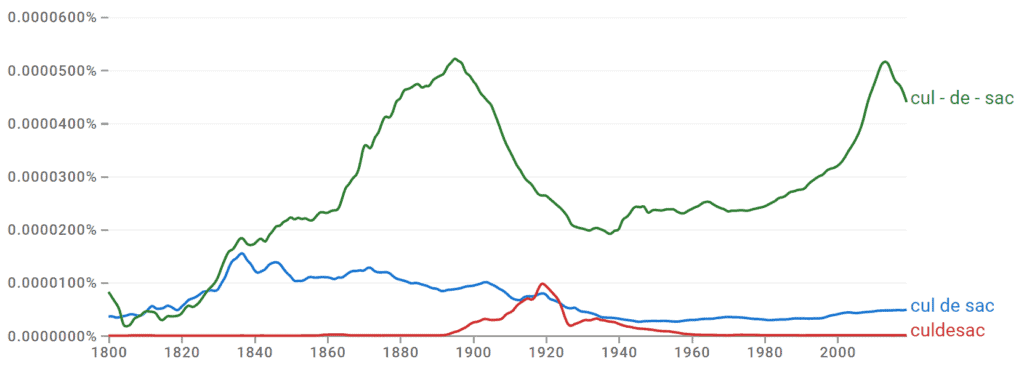What does cul-de-sac mean? If you’re picturing a fancy French dish or a rare wine, I hate to burst your bubble. It’s much more domestic and suburban. This French term has found its way into English and our cities, and it’s all about city planning. So, let’s get into the specifics of what a cul-de-sac is and how to use it in a sentence.
What Is a Cul-de-Sac Street

A cul-de-sac is essentially a dead-end street, usually ending in a roundabout for vehicles to easily turn around, allowing for easy exit from the street. It’s a suburban favorite, making streets safer for kids to play and quieter due to reduced traffic. If you’re playing street hockey or trying to avoid rush-hour mayhem, a cul-de-sac is where you want to be.
I actually grew up on a cul-de-sac for several years when I lived in British Columbia, and I can attest to its quiet atmosphere and safer environment for kids.
Cul-de-Sac or Culdesac or Cul de Sac

When it comes to spelling cul-de-sac, you might see some variance in informal or relaxed settings, like text messages and emails. The traditional and most common spelling you should use is the hyphenated cul-de-sac, especially if you’re writing information about an address or listing a house for sale.
But you might come across culdesac spelling from time to time, but that’s wholly incorrect. The unhyphenated form is less formal and less common, so just stick to cul-de-sac if you want to keep things correct.
Origin and Etymology of Cul-de-Sac
Cul-de-sac is a literal transplant from French, meaning the bottom of the bag. The loanword was first used in English in the 18th century to denote a dead-end in a road or passage. The French sure have a way of making even urban planning sound fancy, don’t they?
What Is Another Name for a Cul-de-Sac?
You can use a few other terms to describe a street similar to a cul-de-sac.
- Dead end
- No through road
- Closed street
- Blind alley
Cul-de-Sac Examples in a Sentence

Now that you’re a cul-de-sac expert, how about I share some sentence examples to give you better context on how to use the word?
- We moved to a cul-de-sac to escape the heavy city traffic and raise our kids on a nice street.
- Living in a cul-de-sac has its perks, like a safe space for the kids to play and less noise so I can work from home.
- They built their dream house at the end of a quiet cul-de-sac with a white picket fence and a swing set.
- The cul-de-sac near the west side of town was a tight-knit community, with neighbors always helping each other.
- The cul-de-sac was lined with cherry blossom trees, making it a beautiful sight in the spring.
- I grew up on a cul-de-sac, so living on this busy highway road is a huge difference for me.
- Our realtor said houses on cul-de-sacs tend to have higher listing prices because they’re coveted streets.
It’s a Dead End
Whether you’re planning a move to the suburbs or just want to wow your friends with your urban planning knowledge, you’re now fully equipped to chat about details of the dead-end roads we call cul-de-sacs.
Check out some other articles we covered:
